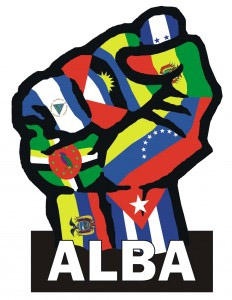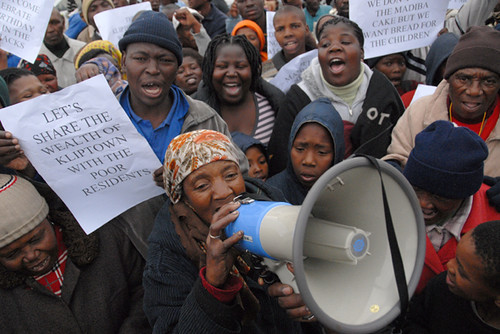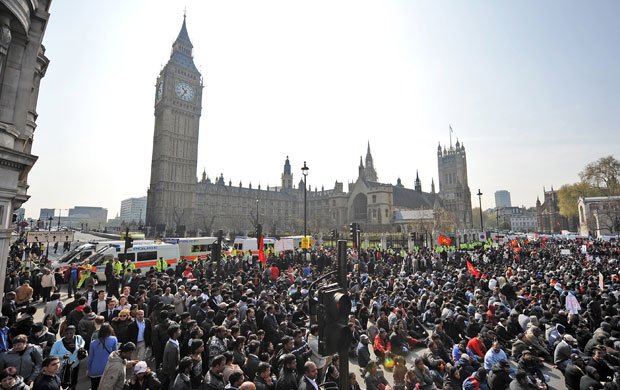`Foro Social Latinamericano', Green Left Weekly's Spanish-language supplement, Feb.-March 2012 issue

February 27, 2012 -- Links International Journal of Socialist Renewal -- For environmentalists, Indigenous rights activists, feminists, socialists and all progressive people, Latin America is a source of hope and inspiration today. The people of Venezuela, Cuba, Bolivia and Ecuador, among others, are showing that radical social change is possible and a better, more just society can be imagined and built.
The tide of rebellion and revolution now sweeping Latin America is posing a serious challenge to imperialism’s brutal global rule. For anyone who wants an end to war, exploitation and oppression, Latin America’s struggles to create alternatives are crucially important.
Australia's leading socialist newspaper Green Left Weekly is strongly committed to supporting the growing “people’s power” movement in Latin America. Through our weekly articles on developments in the region, GLW strives to counter the corporate media’s many lies about Latin America’s revolutions, and to give a voice in English to the people’s movements for change.
Bolivia: Challenges face Morales' goal of 'governing by obeying the people'

A march by indigenous group Conisur in favour of a controversial highway being built through Indigenous lands.
February 19, 2012 -- Green Left Weekly -- A new twist in the turbulent saga surrounding a proposed roadway through Indigenous land has reignited a debate raging throughout Bolivia since the middle of last year. The controversial highway ― which would cut through the Isiboro-Secure National Park and Indigenous Territory (TIPNIS) ― has been at the centre of protests and counter-protests. It has polarised Bolivian society and divided Indigenous groups that are the heart of the Evo Morales government’s social base.
'Uneven and combined Marxism' within South Africa’s urban social movements

A protest by Kliptown Concerned Residents and the Anti Privatisation Forum.
By Patrick Bond, Ashwin Desai and Trevor Ngwane
Get political! Occupy activists urged to engage with writings of Trotsky, Lenin and Luxemburg
[Read more from Links International Journal of Socialist Renewal on Lenin, Trotsky and Rosa Luxemburg.]

Tamils protest in London, April 2009, during the Sri Lankan government's brutal war to crush the Tamil movement for national rights.
By Ron Ridenour
February 20, 2012 – Links International Journal of Socialist Renewal -- Brace yourselves Tamils in and from Sri Lanka! The United Nations Human Rights Council will not grant you justice at its 19th session, on February 27-March 23, 2012 or, perhaps, in any foreseeable future.
Until the past few weeks it looked as though the “international community” (US, UK-Europe, Canada, Australia, Japan), the east (Russia, China, India, Pakistan, Iran), the Middle East-Libya/Africa and the progressive global South (Cuba-ALBA+, South Africa) were content with ignoring Sri Lanka’s war crimes and crimes against humanity.
Tariq Ali interviewed on Russia Today, February 15, 2012. Ali warns that the consequences of Western military intervention would be "worse than in Libya". “The fact is that the overwhelming majority of people in Syria want the Assad family out – and that is the key thing that we have to
The Lenin wars: Over a Cliff with Lars Lih

Nadezhda Krupskaya and Lenin with journalist Lincoln Eure in the Kremli
Lars Lih: Falling out over a Cliff

Click HERE to follow the entire debate on Tony Cliff's Lenin. For more discussion on revolutionary organisation, click HERE.More articles by Lars Lih are available at http://links.org.au/taxonomy/term/500.
* * *
Remarks on the 1905 Congress and the 1912 conference of the Russian Social Democratic Worker Party (RSDWP)
By Lars T. Lih
Paul Le Blanc: Revolutionary organisation and the ‘Occupy moment’

Occupy Pittsburgh, October 15, 2011.
Russia: The people are not silent, but what comes next?

Massive rally in Moscow in support of honest elections, February 4, 2012.